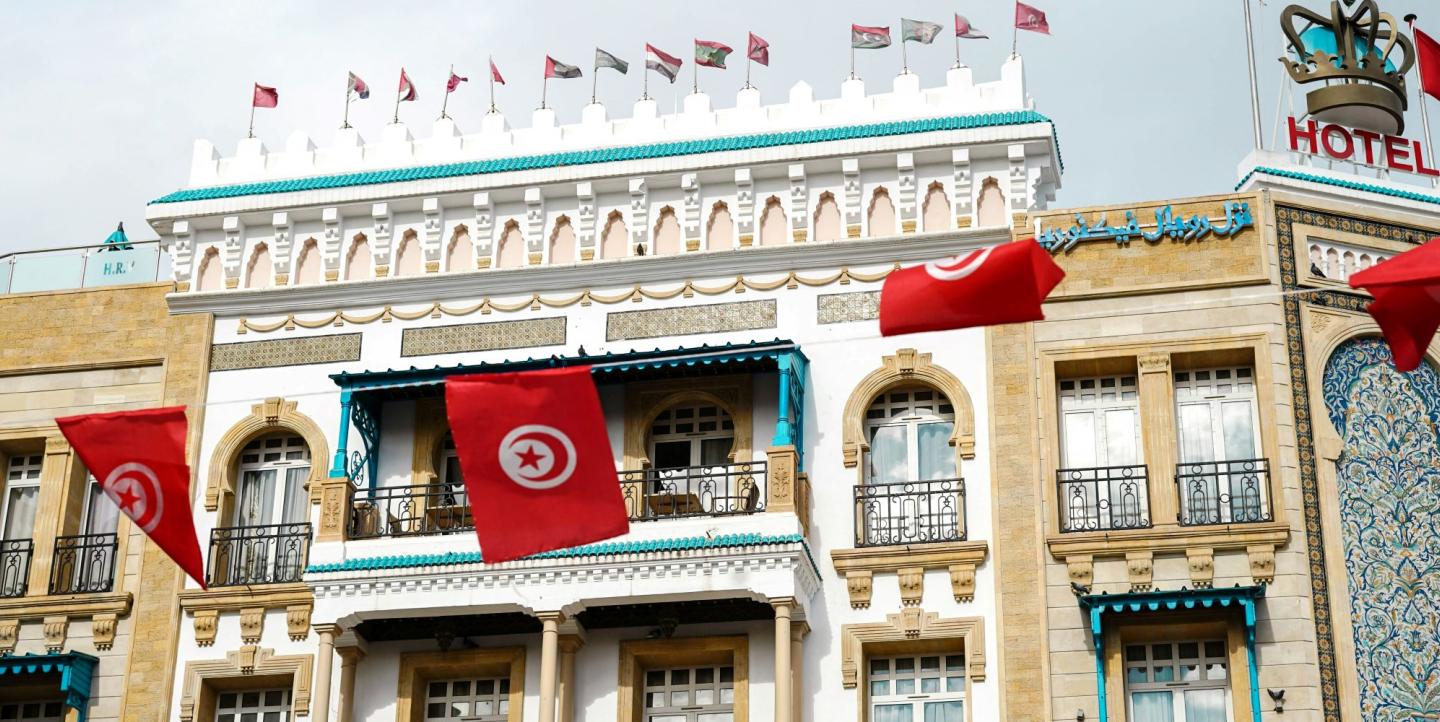This fall, Tunisia will head to the polls for its first presidential election since President Kais Saied carried out a “self-coup” in 2021, dissolving the country’s Parliament and rewriting the constitution.
Human rights organizations and political think tanks have expressed doubts about the freedom and fairness of the upcoming elections, as the Saied administration has cracked down on independent media and prohibited international observers from conducting oversight.
Prominent opposition candidates have been sentenced to prison, as have journalists, prompting the EU to voice concerns regarding their ability to freely cover the election. Just this month, the government arrested five journalists. Two have since been released, while three remain in prison as of May 15 on charges of spreading false information based on social media posts or articles critical of the government.
In late December, Tunisian authorities arrested Al Jazeera journalist Samir Sassi and independent radio station commentator Zied el-Heni. While authorities filed no charges against Sassi, el-Heni was charged with “insulting others on social media” during a radio broadcast in which he criticized the country’s Minister of Commerce Kalthoum Ben Rejeb.
These arrests follow multiple detentions of journalists by Tunisian authorities in 2023, including of Noureddine Boutar, the director of Mosaique FM, an independent radio station frequently critical of President Saied.
Ahead of the 2024 presidential election, I spoke with several Tunisian journalists about the country's eroding press freedom.
Press freedom in Tunisia
Tunisia is considered the only country whose Arab Spring revolution led to a peaceful transfer of power and transition to democracy. In 2014, Tunisians approved a new constitution, and later that year and again in 2019 the country held free and fair democratic elections.
One result of the 2011 revolution was a newfound press freedom as independent media bloomed. “We used to be the first Arab country in terms of freedom of the press and freedom of expression,” said Abdelkrim Hizaoui, founder and director of the Media Development Center in Tunisia. Hizaoui founded the Media Development Center in 2014 to support Tunisian media in the aftermath of the Arab Spring.
Bahija Belmabrouk, senior editor at the TAP News Agency, has worked in journalism for more than 20 years. She remembers the period after the Tunisian Revolution as a time when journalists enjoyed their freedom. “After the Arab Spring, we had the space to say what we want, when we want. We could criticize anyone, anywhere,” Belmabrouk said.
In 2019, political outsider Kais Saied upended this freedom. Running as a conservative candidate independent of a political party, Saied won the presidential election, and two years later he issued an emergency declaration to fire the prime minister, freeze Parliament, and assume total executive power.
Since 2021, press freedom in Tunisia has plummeted, dropping from 72 in Reporters Without Borders’ 2019 World Press Freedom Index to 118 in 2024. “Now, the situation is getting very bad, very quickly,” Hizaoui said. “We have one-man rule in Tunisia.”
Laws targeting journalists, and self-censorship
Laws enacted to silence journalists have served to quash their independent reporting.
At least 20 individuals have been detained or charged under a 2022 cybercrime law, Decree-Law 54, that vaguely outlaws spreading “false data, rumors, false or falsified documents [...] with the aim of infringing the rights of others, or harming public safety or national defense or sowing terror among the population.”
The vagueness of the law’s wording has allowed the Saied government to detain political opponents, journalists and members of the judiciary. Among those charged under Decree-Law 54 include Nizar Bahloul, editor of Tunisian news outlet Business News, who was arrested under charges of spreading false information in November 2022 after publishing an article criticizing Prime Minister Najla Bouden.
“All of the journalists now are scared about getting punished and put in prison,” said Hizaoui. “In the public media now, you will not read or see or hear any content criticizing the president or the government. We still have some critical content in the private media, in the newspapers, but no longer in the public media.”
Journalists have also faced reprisals for criticizing government policies. In April 2023, Belmabrouk published an article about NGOs criticizing Tunisian policies toward undocumented immigrants, after President Saied’s February 2023 speech ordering officials to take urgent measures to tackle irregular migration. After the article was published, Belmabrouk said that she was forbidden from publishing her work for six months.
“We don’t have the right to criticize the strategic choices that the government has made. We can’t criticize this president or the prime minister,” Belmabrouk said.
As journalists have become targets of the Saied administration, many are self-censoring to avoid reporting critically on the government.
“There are many cases of journalists who today are afraid to work because there is a real climate of fear which has been installed by the Tunisian authorities against journalists,” said Florianne Heine, regional director of North Africa for Reporters Without Borders. “Unfortunately, there is a real campaign targeting independent journalists and journalists who dare to give information freely and independently.”
Looking ahead to the 2024 elections
The state of Tunisian press freedom may seem dire, but it’s not hopeless, reassured Hizaoui.
“We can’t go back to the situation during the period of dictatorship [before the 2011 revolution]. We can’t go back because people have now gained this freedom,” he said. “We need to stay committed and keep pushing the media and the owners of the media.”
In January, major media organizations in Tunisia issued a statement from the headquarters of the National Union of Tunisian Journalists acknowledging that press freedom in the country is in crisis. The statement also articulated a number of demands, including that the government stop using Decree-Law 54 and other laws to “persecute, intimidate, and imprison journalists.”
“Tunisian journalists are courageous, and they have lived the experience before 2011. They are aware that they are the greatest guarantors of freedom of the press and freedom of expression in Tunisia with their union and their civil society, and they lead a fierce fight for respect for freedom of the press,” said Heine. “They can only win it.”
Photo by Hammami Ghazi on Unsplash.


